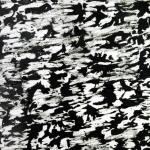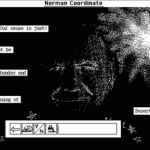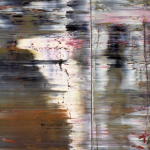Henry Jenkins responds
Henry JenkinsWho says hypertext readers have more brains than gamers? Not Henry Jenkins.
The Pleasures of Immersion and Interaction
Andrew HargadonJ. Yellowlees Douglas and Andrew Hargadon on the affective side of hypertexts via "schemas, scripts, and the fifth business."
Satisfying Ambiguity
Rob SwigartFrom the Oracle of Delphi to the Wizard of Oz, it is clear that "if we attack we will destroy a great empire." The only question that remains, is which one?
Is There a Language Problem?
R. M. BerryR.M. Berry on the recuperation of politicized language, in (and through) the fiction of Marianne Hauser and Lidia Yuknavitch.
Form and Emotion
Lucy CorinAuthor Lucy Corin opposes the emotionalism of genre fiction to the deeply emotional formalism in the fiction of Harold Jaffe, Patricia Eakins, and Janet Kauffman.
Meditations on the Blip: a review
Lisette GonzalesLisette Gonzales reviews a book of essays by Matthew Fuller that examines the way we are programmed by software.
Markku Eskelinen’s response to Julian Raul Kucklich
Markku EskelinenMarkku Eskelinen reiterates the bounds of ludology.
Tending the Garden Plot: Victory Garden and Operation Enduring…
David CiccoriccoDave Ciccoricco returns to Stuart Moulthrop, considers Operation Enduring Freedom (2003) in light of Operation Desert Storm (1991), and consults the annals of World War II for a likely source of "Victory Garden," the title of Moulthrop's 1991 network fiction on the Gulf War.
Mister Squishy, c’est moi: David Foster Wallace’s Oblivion
Kiki BenzonKiki Benzon on narrative ecology and the "fradulence paradox" of Oblivion.
a Joseph McElroy festschrift
Andrew WalserAndrew Walser introduces a gathering of essays on and by the novelist Joseph McElroy.
How to Avoid Being Paranoid
Melissa Gregg"Sedgwick's emphasis is on generating concepts that add to the complexity and inclusiveness of our representations, rather than trying to prescribe the right revolutionary path." Melissa Gregg reviews Eve Sedgwick's Touching Feeling.
Notes Toward a Proleptic History of Electronic Reading
Matthew G. KirschenbaumMatthew Kirschenbaum rethinks the final section of First Person in light of "five basic strategies for furthering the history of reading."
A Poetry of Noesis
Tim KeaneOn Joseph McElroy's Fiction as a lifelong, dramatic investigation of noesis - that abstract but
evocative concept rooted in Platonic idealism and redefined(through Phenomenology) as
those ineluctable acts of consciousness that constitute reality.
If It Could Be Wrapped
Joseph McElroyExcerpted from Water Writing - an essay; presented as part of the ebr Critical Ecologies thread; concurrent with a literary Festschrift in honor of Joseph McElroy's lifework.
History as Accretion and Excavation
Paul GleasonPaul Gleason on Joseph McElroy's mid-career epic, Women and Men, as contrasted with Don DeLillo's Underworld.












